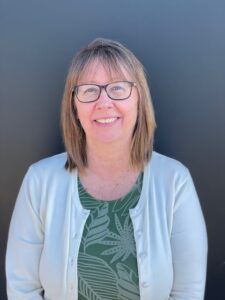This post is part of Mennonite Church USA’s #BeTransformed series.

Lorraine Stutzman Amstutz is Mennonite Church USA’s denominational minister for Peace and Justice. For more than 25 years, she served as the coordinator of Mennonite Central Committee’s Restorative Justice program. She also co-authored “The Little Book of Restorative Discipline for Schools” and “What Will Happen to Me?” Lorraine graduated from Eastern Mennonite University, Harrisonburg, Virginia, with a bachelor’s degree in Social Work, and earned a master’s in Social Work from Marywood University, Scranton, Pennsylvania. She and her husband attend Blossom Hill Mennonite Church, Lancaster, Pennsylvania.
_________________________________
In his book, “Forty Days on Being a Seven: Enneagram Daily Reflections” — which now tells you something about me — Gideon Yee Shun Tsang talks about the difference between change and transformation. He says, “Change is when we take on something new. Transformation occurs when something old falls away, usually beyond our control.” Transformation happens when we have experiences that change the way we understand life.
There have been many moments of change in my life that are valuable, but what has been most transformative are the relationships that have sustained me through those changes.
I am so appreciative that my transformative life experiences, while difficult, have led me to people and career choices in which I felt connected and loved. One of my earliest transformations was the recognition that I was different from my friends, because I lived, up until age 10, with my birth mother and knew nothing about my birth father. I had half siblings, step siblings, siblings I had never met, and I had parents/siblings by choice to care for me, when my home was not a safe place for me to be. All of this remains part of my journey, thanks to my son’s persistence with ancestry websites and finding previously unknown connections. And, yes, all of this continues to bring up a lifetime of emotions, as I reconcile the multiple complexities of my birth family and adopted family. I recently spoke in my spouse’s class about foster care/adoption, and one of the questions asked was, “Do you ever wish you would have stayed with your birth family?” I’m not sure why I was taken aback by that question, but I was, and it brought up a lot of emotions very quickly. The reality is that I am who I am because of my experiences, and I can’t imagine my life without all of them and the relationships they has brought me. But some of those experiences were also traumatic … and healing.
A second journey of transformation relates to my work with peace and justice issues within the church and how that has shaped my life. As a teen attending a Mennonite college and trying to figure out who I was, I came to realize how significant playing the “Mennonite game” was to a sense of belonging and privilege within the church. My last name was one that was recognized, and connections were assumed, even though I had no inherent connection to the church. Nor did I have any connection to the name itself, other than that it was the man my mother had been married to, and separated from, at the time of my birth, but he was not my birth father.
That privilege highlighted, among other things, whose voice was elevated. It was the beginning of my journey toward understanding my own privilege. That journey continued, as I began my work at Mennonite Central Committee and had the opportunity to be with colleagues working to dismantle systems of oppression. Those relationships were, and continue to be, transformational for me. My colleagues valued me for my story and my gifts. I was enough. That work, and valued relationships, continues in my time with MC USA, even as the journey to reconcile the story of my life remains.
Reconciling multiple complexities is often how I feel about the church. Some of us come with high expectations of what the church can and should be, and some are woefully disappointed when those expectations are not met.
But that’s the hope I have for the church: that we can ensure that everyone who desires to be connected and loved can experience the Holy Spirit’s transformative power through our relationships with one another and with God.
I continue to believe transformation is possible.
The views and opinions expressed in this blog belong to the author and are not intended to represent the views of the MC USA Executive Board or staff.
Interested in submitting a blog for Menno Snapshots? Please see our blog guidelines here.

